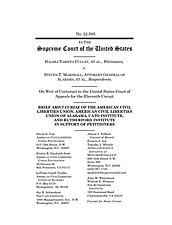Learn more about Cato’s Amicus Briefs Program.
Halima Culley and Lena Sutton allowed a friend and a family member to borrow their cars. Unbeknownst to them, both individuals were in possession of drugs while driving. After being stopped by police, the vehicles were seized and local law enforcement brought civil forfeiture actions against Culley and Sutton. It took over a year for the state court to rule on the forfeiture cases, leaving both women without their cars for that entire period of time. And so, even though Culley and Sutton were innocent owners, both women were forced to wait more than a year for an opportunity to challenge the state’s retention of their property.
Culley and Sutton sued the government under 42 U.S.C. § 1983, arguing that the state deprived them of due process by retaining their cars without providing them with a prompt post-deprivation hearing. To determine whether an existing procedure violates due process, courts typically employ a three-part analysis set forth in Mathews v. Eldridge. But in ruling against Culley and Sutton, the district court applied the Sixth Amendment speedy trial test from Barker v. Wingo, which concerns itself with only the timeliness of the final hearing. The Eleventh Circuit affirmed, holding that the district court correctly applied Barker, and rejecting the Mathews framework for due process challenges to civil forfeiture regimes.
Cato, along with the ACLU, the ACLU of Alabama, and the Rutherford Institute, filed an amici brief explaining how modern civil forfeiture schemes fail to provide adequate due process and urging the Supreme Court to adopt the Mathews test for due process claims involving civil forfeiture. The use of civil forfeiture by American law enforcement has exploded in the past fifty years, and the combination of perverse incentives, lax oversight, and complex procedures sets the stage for myriad injustices. For this reason, due process protections are especially critical in civil forfeiture schemes, where the affected party lacks many of the procedural guarantees afforded criminal defendants, and structural imbalances facilitate the arbitrary exercise of government power. The Mathews framework appropriately respects the flexible nature of due process and has proved to be a workable standard for district courts in a variety of contexts, including civil forfeiture. It governs any deprivation of property, while the Barker test only looks at the outer limits of constitutionally acceptable delay.The Supreme Court should reverse the Eleventh Circuit and adopt the Mathews framework to ensure that the demands of due process are satisfied where the government seeks to maintain possession of seized property in civil forfeiture proceedings before a final judgment is rendered.
View this case’s court docket, including the full opinion, here.

This work is licensed under a Creative Commons Attribution-NonCommercial-ShareAlike 4.0 International License.


